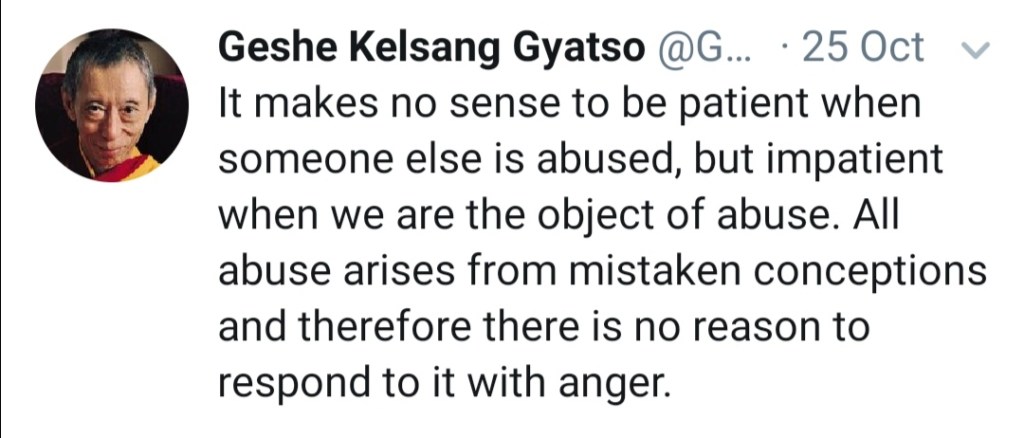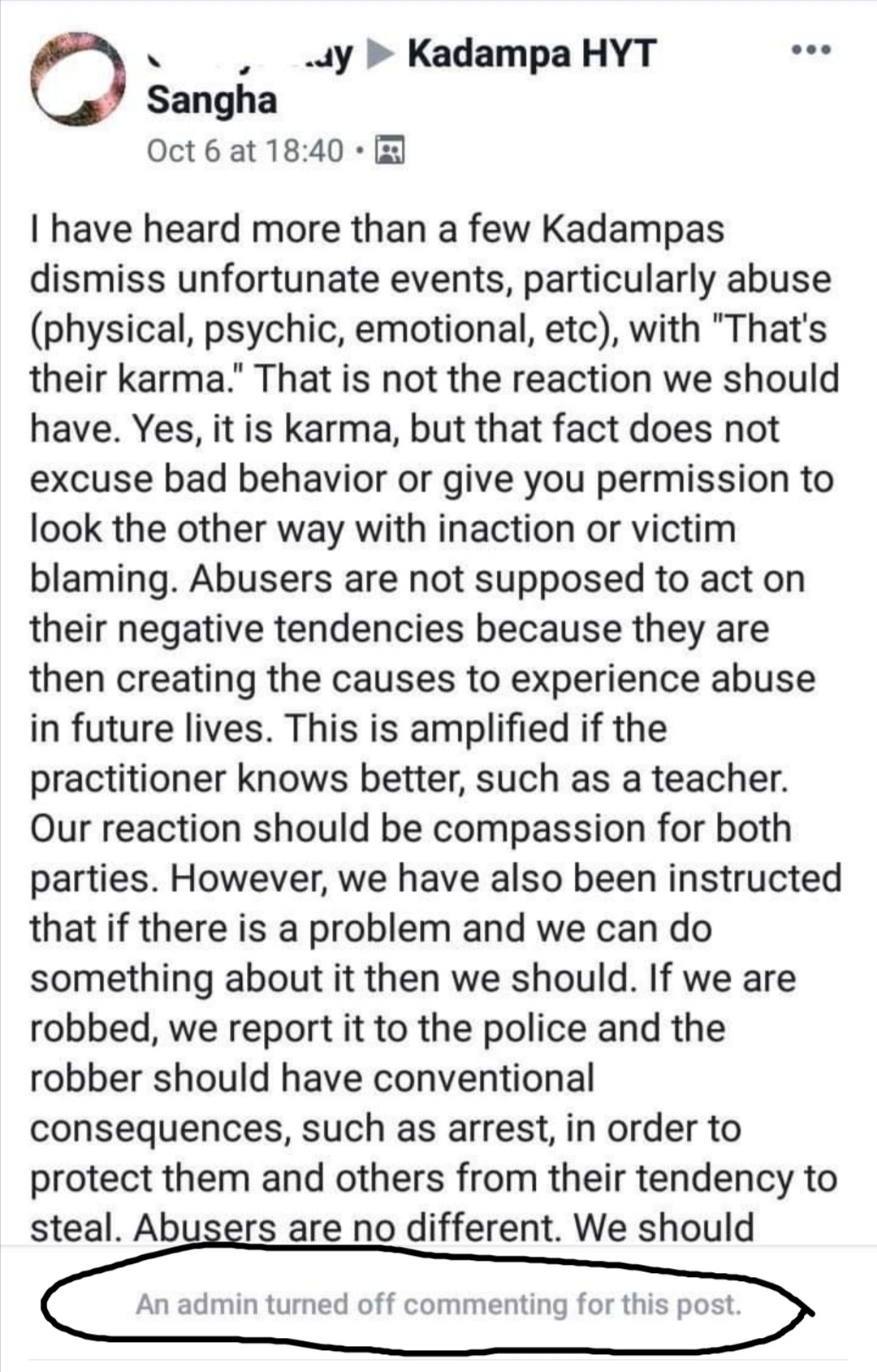
Due to the encouragement to view all human beings as faultless, including your abuser (during an act of abuse), and your own feelings as ‘empty of inherent existence’, it is very difficult for people to recognise they are in fact being abused. Anders (2019a) asserts that when Buddhism was commercialised and copied unreflectively to the West accompanied by power structures the spiritual symbolism led to the masking of all of the individual pain inflicted upon people as well as the violation of human rights.
Ex-members report that when they attempted to speak up about abuse they were told variations of:
- ‘We have to let people make mistakes’
- ‘We all still have delusions’
- ‘If we expected teachers to hold moral discipline all the time we would have no teachers’
- ‘Everything is empty’
- ‘You must have done something similar in a previous life/it’s your karma’
- ‘Practice compassion’ (for your abuser)
I personally was told by the admin director at Nagarjuna KMC when I disclosed psychological abuse from an NKT teacher that ‘nothing matters, that’s what Bridget says’. (This is not Buddhism, this is nihilism). I was told by a friend that I had an impure mind, and a nun that I should meditate on being a piece of wood, so that I felt nothing in order to assist me to stay in the situation.
Karma beliefs are used to suggest that any emotional pain should be ‘purified’ whilst keeping a view of the abuser as faultless, or even as your teacher. According to Anders (2019b) karma purification beliefs mask human exploitation and traumatization by using spiritual guises and ‘every available means to achieve concealment’.
The damaging incidents remained hidden for decades, by stigmatizing victims and ignoring the harm endured, instead even framing it as beneficial in the sense of the assumed purification of their ‘bad karma’.
Anders (2019b)
I believe this teaching is used to keep people from whistleblowing abuse or acting to protect themselves from exploitation by the NKT.

Below is a Facebook post by a senior monk and teacher within the NKT, sharing his view on how to cope with abusive behaviour. He suggests that controlling your thoughts by blaming your karma will allow you to avoid suffering from this abusive experience. In my opinion he also suggests here that on some level, this woman deserves to be verbally and emotionally abused based on her previous actions, although I doubt he would admit it.

Myself and many other ex-members believe this reflects the NKT’s general attitude towards abusive behaviour: that the fault is with the victim, not the abuser, and the victim’s job is to keep a ‘happy mind’ throughout the abuse. Your reaction to the abuse (e.g. anxiety and trauma) is therefore your fault as it is created by your mind, and not the fault of the abuser.

According to Be Scofield, ‘The Guru Hunter’, in a current podcast series called ‘Toxic Spirituality’ this kind of belief system is ‘a narcissists dream’. One anonymous ex-member states ‘Kadampa Buddhism is probably great skills training for narcissists and people on power trips. But I don’t think it’s helpful to women like me who are struggling to find their voice and establish personal boundaries’.
My own experience of trying to transform anger meant that I reinforced my own tendency to patiently accept bad behaviour in others instead of setting firmer boundaries. I once accidentally enabled serious psychological abuse from an NKT teacher towards his mother which left her in tears. I was too busy focusing on trying to have patience and remember he was faultless to realise he was committing an act of abuse that indicated a serious personality difficulty, and not just a moment of anger. I then continued to allow this abusive person to have access to me until I reached crisis point, which has had a long lasting effect on my health. One could argue that a more experienced and well-read Buddhist practitioner without any attachment difficulties might have known to exit the situation immediately, but NKT teachings are not subtle enough to assist people in developing this understanding.
No consequences for abuse
The NKT does not have any safeguarding policies or procedures. When I attempted to raise safeguarding concerns I was told ‘it’s all just karma’ and ‘we cannot get involved in relationships’. Speaking to other ex-members has confirmed that this is the general attitude towards abusive behaviour throughout the NKT internationally. It has allowed alleged sexual abusers to continue holding senior positions within the organisation.
Inform state that:
‘Former members have reported that as their commitment to the group deepened,
encouragement to practice ‘pure’ Kadampa dharma dampened their critical thinking
about the attitudes and behaviours they experienced within the group and later re- assessed. Some former-members have expressed concern at feeling encouraged to
develop a practice of treating Kelsang Gyatso and his authorised teachers as fully
enlightened and to consider what they later determined to be ‘unethical behaviour’ as
faults of their own perception. In particular, some former-members have expressed
distress on how allegations of sexual activity by influential ordained members have
been dealt with by the organisation’.
Despite asking new residents to sign a written agreement regarding sexual misconduct, there does not appear to be a rule about residents and teachers not having sexual relations with vulnerable working visitors, or with those who attend their teachings. Many other Buddhist groups discourage teachers from having sexual relations with those who attend their teachings due to power imbalances. No background checks are done on teachers, meaning they could have a history of criminal behaviour and have access to vulnerable people attending their teachings and looking for solutions to their distress.
Spiritual organisations often rely on their own teachings to address abuse, and assume that if everyone continues practicing diligently that it will eventually stop (e.g. ‘we all still have delusions……but one day if we all keep practicing we will all be free of delusions and therefore bad behaviour’). However the group’s ideology itself may be hiding and even rationalising abuse (Remski, 2019). In addition, some people have narcissistic and sociopathic personality traits, meaning that they may not be making mistakes at all, they may be intentionally causing harm. Due to the teachings on enduring suffering, those who are vulnerable may believe they should endure this kind of treatment in order to destroy their ‘self-cherishing’. This allows people with sadistic tendencies to abuse those with masochistic tendencies while everyone is under the impression that they are achieving enlightenment.
As a result, in my opinion it is likely that those who stay in the NKT for many years and continue to feel fulfilled may have sadistic or mashochistic tendencies. It is also likely that many ex-members will have suffered serious abuse and could have complex post-traumatic stress symptoms following this, especially due to the extent of the gaslighting of your perception of senior members as other than perfect.
The #metoo movement has now hit Buddhism, and more and more stories of indoctrination and abuse are being told. Anders (2019b) argues that recently in so called ‘Buddhist’ groups ‘processes of exploitation and submission, especially towards the feminine, and the depersonalization of group members, leading to economic, physical and psychological abuse, became evident‘.
Sadly there still aren’t that many testimonies from ex-NKT members due to fear of attack by senior members. (Many have told me this is their reason in private messages)
References
Anders. A. I. M. (2019a). Psychological impact of power abuse in Buddhist groups and essential aspects in psychotherapeutic interventions for the affected individuals. SFU Research Bulletin, 7/1, S. 32-50 DOI: 10.15135/2019.7.1.32-50.
Anders, A. I. M. (2019b). Silencing and Oblivion of Psychological Trauma, Its Unconscious Aspects, and Their Impact on the Inflation of Vajrayāna. An Analysis of Cross-Group Dynamics and Recent Developments in Buddhist Groups Based on Qualitative Data. Religions, 10(11), 622